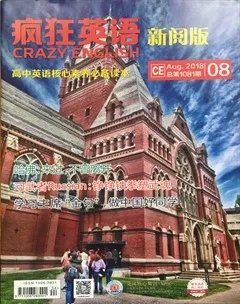美国作家让孟姜女的故事不再“凉凉”
[精彩导读]
49岁的美国小说家John Shors在游历长城、咨询了大约六位中国文化和历史专家,并查阅了诸多关于长城的典籍后,历时两年,根据中国古典小说《孟姜女》,创作了小说Unbound。赋予妇女权利是故事中的一个重要主题,Shors希望他的女主角孟能反映出女性在中国历史上所扮演的强大角色。因此,他赋予了新作皆大欢喜的结局。
American novelist John Shors, 49, has seven novels and all of them are set in Asia.
His latest novel Unbound is a love story that takes place on the Great Wall. Unbound is based on an ancient Chinese folk tale about Lady Meng Jiang. Shors fleshed out the original story with fictional side characters and subplots (次要情节).
While the folk tale ends with the tragic(悲惨的) deaths of Meng and her husband Fan Xiliang, Shors finished his version with a pleasant ending.
Christine Branstad, the wife of the US ambassador to China, Terry Branstad, has read Unbound and recommended it to friends and family, both in China and in the United States. Commenting on the book, she said in an e⁃mail,“My husband and I have both read it and loved the beauty of the story and the history of the Great Wall. It is a true gift to be able to share that story with the world.”
The tall, thin and soft⁃spoken author backpacked(背包旅行) across 10 Asian countries when he was 24. And, in 1999, when he was backpacking again in Asia with his wife Allison, Shors discovered the love story behind Indias Taj Mahal that inspired his first novel, Beneath a Marble Sky. Since then he has written stories set in Vietnam, Thailand, Cambodia and Japan.
“I wanted to see the Great Wall, I wanted to walk it, I wanted to understand it, and of course, I wanted to write a book about it,” said Shors.
To create an accurate portrayal(描述) of Chinese culture for the book, Shors spent four months researching before his book in 2014, a two⁃week trip to Beijing in 2013 included. Then, he walked along the Great Wall for almost a week and felt the texture (质地) of the bricks, in an effort to imagine spending time on it from the perspectives (观点) of his characters in the book.
“My time on the Great Wall allowed me to see its beauty.” said Shors.
“This is a graceful, elaborate structure that is far more than a never⁃ending pile of stacked (堆叠的) stones.”
Shors admits to his limitations of having to rely on English translations of Chinese historical accounts.
During the two⁃year writing process, he consulted (咨询) about six experts on Chinese culture and history, including a few from the University of Colorado and one from China. Referring to Shors efforts to get the right details, Jeremiah Jenne, a Chinese history teacher said, “The research shors did on material culture is really fruitful, like some of the descriptions of the clothing, weapons and food.”
The book is titled Unbound because its heroine, Meng, has unbound feet and what Shors calls an “unbound spirit”.
Womens empowerment(授权) is an important subject in the story. As Shors sees it, Chinese women pushed boundaries in very subtle (微妙的) ways, for instance, in writing good poetry and getting out of home to travel.
Shors wanted his heroine Meng to reflect the powerful roles women played in Chinas history.
“I think theres a concept (概念) in the West that historically women in Asia were powerless. I just dont think thats accurate,” said Shors.
“I wanted to show women as they truly were, perhaps repressed(被压制的) but yet powerful in their own way.”
And he doesnt expect there to be more criticism (批评) coming from Chinese readers than from other parts of the world.
Mrs Huang, who worked with Shors when the Chinese version of his fourth book The Wishing Trees was published in China in 2011, said she considers Unbound a “faithful, interesting and innovative approach” to Chinese traditional folk tales that will appeal to readers beyond China.
[阅读扫障]
1.be set in 以……为背景
2.take place 发生
3.be based on 以……为基础
4.flesh out 使有血有肉;充实;使……具体化
5.recommend ... to 把……推荐给
6.rely on 依靠
7.refer to 提到;参考
8.for instance 例如
9.appeal to 引起兴趣;有吸引力
[语言提取]
1.民间故事是以孟和丈夫范喜良的惨死结尾,而Shors则以一个愉快的结局结束了他的故事。
the folk tale ends with the tragic deaths of Meng and her husband Fan Xiliang, Shors finished his version with a pleasant ending.
【点石成金】while引导让步状语从句时,需要放在主句前面。答案为While。
2.能够与世界分享这个故事是一个真正的礼物。
to be able to share that story with the world.
【点石成金】it常可用于代替动词不定式,充当句子的形式主语。句中it代替的是 to be able to share that story with the world。答案为It is a true gift。
3.自那以后,他以越南、泰国、柬埔寨和日本为背景,写了一些故事。
Since then he stories Vietnam, Thailand, Cambodia and Japan.
【点石成金】现在完成时常和since连用,故第一空应填写has written;第二空应为set in,是过去分词作后置定语,相当于which / that are set in。答案为has written; set in。
4.(1)Shors花了4个月的时间研究了他在2014年出版的书,其中包括2013年的一次为期两周的北京之行。
Shors spent four months researching before his book in 2014, a two⁃week trip to Beijing in 2013 (include).
(2)在两年的写作过程中,他咨询了大约六位中国文化和历史专家,其中几位来自科罗拉多大学,一位来自中国。
During the two⁃year writing process, he consulted about six experts on Chinese culture and history, (include)a few from the University of Colorado and one from China.
【点石成金】included和including用法不同。前者用于sb / sth included结构,而后者用于including sb / sth结构。答案分别为included和including。
5.一位教中国历史的教师Jeremiah Jenne在谈到Shors为了弄清细节所做的努力时说……
(refer)to Shors efforts to get the right details, Jeremiah Jenne, a Chinese history teacher says...
【点石成金】句中所缺部分应为非谓语动词,且和主语Jeremiah Jenne构成主谓关系,故使用现在分词作时间状语。答案为Referring。
6.他也不期望来自中国读者的批评会比来自世界其他地方的批评更多。
And he doesnt expect more criticism coming from Chinese readers than from other parts of the world.
【点石成金】expect常用在expect sb / sth to be结构中。答案为there to be。
[译文助读]
美国小说家John Shors今年49岁,已写七部小说,都是以亚洲为背景的。
他的最新小说Unbound是发生在长城的一个爱情故事。Unbound是以中国古代孟姜女的民间故事为基础的。Shors用虚构的侧面人物和次要情节充实了原著。
民间故事是以孟和丈夫范喜良的惨死结尾,而Shors则以一个愉快的结局结束了他的故事。
美国驻华大使Terry Branstad的妻子Christine Branstad读过Unbound这本小说,并将其推荐给在中国和美国的朋友和家人。在评论这本书时,她在一封电子邮件中说:“我和我丈夫都读过这本书,并且喜欢这个故事的美和长城历史的那一部分。能够与世界分享这个故事是一个真正的礼物。
这位高个子、瘦削的、说话温柔的作家在24岁的时候,在10个亚洲国家进行了背包旅行。1999年,当他和妻子Allison再次在亚洲背包旅行时,Shors发现了印度泰姬陵背后的爱情故事,这启发了他的第一部小说Beneath a Marble Sky。自那以后,他以越南、泰国、柬埔寨和日本为背景,写了一些故事。
“我想看长城,我想在它上面走一走,我想了解它,当然,我想写一本关于它的书。”Shors说。
为了准确地描绘这本书中的中国文化,Shors花了4个月的时间研究了他在2014年出版的书,其中包括2013年的一次为期两周的北京之行。然后,他沿着长城走了将近一周,感受到了砖块的质地,花时间试图从书中人物的角度来想象待在长城的情景。
“我在长城的时光让我看到了它的美丽。”Shors说。
“这是一座优美而精致的建筑,远远不止一堆堆积如山的石头。”
Shors承认,他不得不依赖中国历史记载的英文译本,这是他的局限性。
在两年的写作过程中,他咨询了大约六位中国文化和历史专家,其中几位来自科罗拉多大学,一位来自中国。一位教中国历史的教师Jeremiah Jenne在谈到Shors为了弄清细节所做的努力时说:“shors对物质文化的研究是富有成效的,比如对服装、武器和食物进行的描述。”
这本书的书名是Unbound,因为它的女主人公孟有一双解除绑缚的脚,而Shors称之为“无束缚的精神”。
赋予妇女权利是故事中的一个重要主题。在Shors看来,中国女性以非常微妙的方式突破了界限,比如写好诗和外出旅游。
Shors希望他的女主角孟能反映出女性在中国历史上所扮演的强大角色。
“我认为在西方有一种观念,历史上亚洲的女性是无能为力的。我只是觉得这是不准确的。”Shors说。
“我想展示女性她们真实的样子,也许是被压制的,但以她们自己的方式显示强大。”
他也不期望来自中国读者的批评会比来自世界其他地方的批评更多。
当他的第四本书《许愿树》于2011年在中国出版时,曾与Shors合作过的黄女士说,她认为Unbound是对中国传统民间故事“忠实、有趣和创新”的一种方式,将吸引中国以外的读者。

